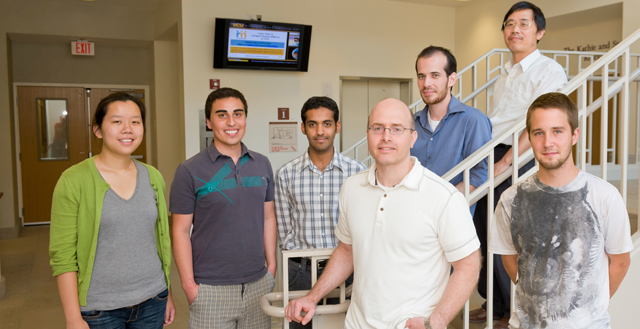Laboratory of Joseph Landry, Ph.D.

Research projects
Epigenetic regulation of the genome occurs by the action of post-translational histone modifications, the incorporation of histone variants, ATP-dependent chromatin remodeling and the methylation of DNA. These modifications change the structure of chromatin regulating the accessibility of DNA to trans-acting factors like transcription factors and other chromatin-associated proteins. Mutation of epigenetic regulators frequently results in deregulated transcription, DNA replication and DNA damage repair and, as a result, has causal roles during cancer development and progression. Dr. Landry’s lab focuses on studying how epigenetic mechanisms regulate the development and progression of human cancers, and if these epigenetic targets can be exploited for the development of novel human cancer therapies.
- The Basic Science of Chromatin Remodeling Complexes
The cell type-dependent and cell type-independent functions for chromatin remodeling complexes are just beginning to be investigated. Many chromatin remodeling complexes show cell type-dependent functions. These functions can occur through interactions with cell type specific transcription factors or processes like VDJ recombination. We are using mouse knockout models of two chromatin remodeling complexes to discover these functions with an emphasis on early mammalian development.
Many complexes remodel chromatin at specific sites in chromatin. Its recruitment to these sites likely occurs through interactions with sequence-specific transcription factors and histone modifications. We are currently using genome-wide ChIP-Seq, DNaseI-Seq and FAIRE-Seq approaches to discover correlations between the location and activity of chromatin remodeling complexes and sequence specific transcription factors. Subsequent interaction studies will investigate if these correlations are the result of direct interactions between specific transcription factors and chromatin remodeling complexes.
- Chromatin Remodeling as a Regulator of Immune Editing
MHC class I and II receptors are critical mediators of immune system function. These receptors are frequently deregulated by tumors to avoid recognition by the immune system. Cytokine therapy is a prominent method of re-regulating MHC receptors in tumors; however, it is toxic to most patients and does not have a long-lasting therapeutic benefit.
Laboratory members have identified specific chromatin remodeling complexes as regulators of the MHC receptors in an attempt to find alternatives to cytokine-based therapies. They have shown that expression of these MHC receptors is dependent on specific chromatin remodeling complexes in both normal and breast cancer cells. In addition, the group has observed many changes in chromatin structure in the absence of specific remodeling complexes at the promoters and putative distal regulatory elements of many MHC genes. These results suggest a causal role for chromatin remodeling in regulating the expression of the MHC receptors.
Ongoing studies in the lab will focus on determining if these chromatin remodeling complexes can be exploited as a means of deregulating MHC receptor expression to reduce the survival of breast cancer cells in vivo. Because remodeling complexes are ATP-utilizing enzymes, the success of these experiments will provide evidence that they are a novel candidate target for the regulation of MHC receptor expression by small molecules therapeutics.
Laboratory members
Key publications
Alhazmi, A., Mack, M., Petencin, A., Nelson, H., Rolle, T., Hiegel, J., Haqqani, S., Dao, N., Zaman, F., Scarsdale, N., Lyons, C., Kim, N-K., and Landry, J.W. (2018) NURF Localizes to Gene Bodies and Regulates mRNA Processing. eLife. (In Revision)
Mayes, K., Alhazmi, A., Elsayed, Z., Alkatib, S., Roberts, M., Peterson, K., Song, C., Blevins, T., Dumur, C., Wang, X.Y., and Landry, J. (2017) NURF Depletion Increases Cancer Cell Immunogenicity and Enhances NK Cell Mediated Antitumor Immunity. Oncotarget. 2017 May 12;8(38):64344-64357. PMCID: PMC5610007
Mayes, K., Alkhatib, S., Peterson, K., Alhazmi, A., Song, C., Chan, V., Blevins, T., Roberts, M., Dumur, C., Wang, X.Y. and Landry, J. (2016) BPTF Depletion Enhances T Cell Mediated Antitumor Immunity. Cancer Research. Nov 1;76(21):6183-6192. PMCID: PMC5093041
Mayes, K., Qiu, Z., Alhazmi, A. and Landry, J. (2014) ATP-dependent chromatin remodeling complexes as novel targets for cancer therapy. Adv Cancer Res. 121, 183-233. PMCID: PMC4839282
Tyutyunyk-Massey, L., Haqqani, S., Mandava, R., Kentiba, K., Dammalapati, M., Dao, N., Haueis, J., Gewirtz, D. and Landry, J.W. (2018) Leveraging Epigenetics to Enhance the Cellular Response to Chemotherapies and Improve Tumor Immunogenicity. Adv Cancer Res. (In Press)
Qiu, Z., Elsayed, Z., Peterkin, V., Alkatib, S., Bennett, D., Landry, J. (2016) Ino80 is Essential for Proximal-Distal Axis Asymmetry in Part by Regulating Bmp4 Expression. BMC Biol. 2016 Mar 14;14:18. PMCID: PMC4790052
Qiu, Z., Song, C., Malakouti, N., Murray, D., Hariz, A., Zimmerman, M., Gygax, D., Alhazmi, A., Landry, J. (2015) Functional Interactions Between NURF and CTCF Regulate Gene Expression. Mol Cell Biol. 35, 224-37. PMCID: PMC4295392